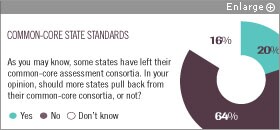About two-thirds of district superintendents say states should stick with their common-core testing consortia, while 16 percent remain on the fence over the issue, according to results from a new survey.
The joint Gallup-Education Week report comes as state leaders have been increasingly re-examining the Common Core State Standards as well as their partnerships for developing and sharing common-core tests. This is the first time Gallup has asked superintendents about their support for the Smarter Balanced Assessment Consortium and the Partnership for Assessment of Readiness for College and Careers, or PARCC, the two main groups of states developing common assessments.
“There’s pretty strong support from superintendents for staying the course,” said Brandon H. Busteed, the executive director of Gallup’s education division. “Only 20 percent recommend pulling out, even though we see a pretty mixed bag when we ask Americans generally.”

SOURCE: Gallup-Education Week Superintendents Panel Surveys
Meanwhile, 73 percent of superintendents surveyed said the common standards are “just about right” for most students.
That represents an increase since survey results released in July showed that 66 percent of district leaders said the standards present an appropriate level of rigor for students.
The latest Gallup-Education Week poll of superintendents is the fifth in a series conducted by the two organizations over the past year.
The Web survey was conducted over two weeks in mid-August. The 1,663 respondents are not a nationally representative mix.
‘Actionable’ Student Data
When asked about data, 38 percent of superintendents strongly agreed that they have “sufficient data on student outcomes” to make “strategic” school district decisions, while 33 percent said that principals have enough access to such data. Fewer superintendents—20 percent—said that they strongly agreed principals receive enough training on data analysis to make good use of it.
“We collect a lot of data in education that go up the chain for accountability, and nothing ever comes back down,” said Mr. Busteed. “These leaders want more formative data that’s more actionable, and a lot of the accountability measures are not helping them do that.”
The survey also delves into how superintendents view professional development for teachers and principals. While 32 percent strongly agreed they have a comprehensive professional-development plan for new teachers, only 17 percent believed the same about professional development for new principals.
“If there’s one place you invest in professional development,” Mr. Busteed said, “it would be in principals in terms of return on your investment.”






